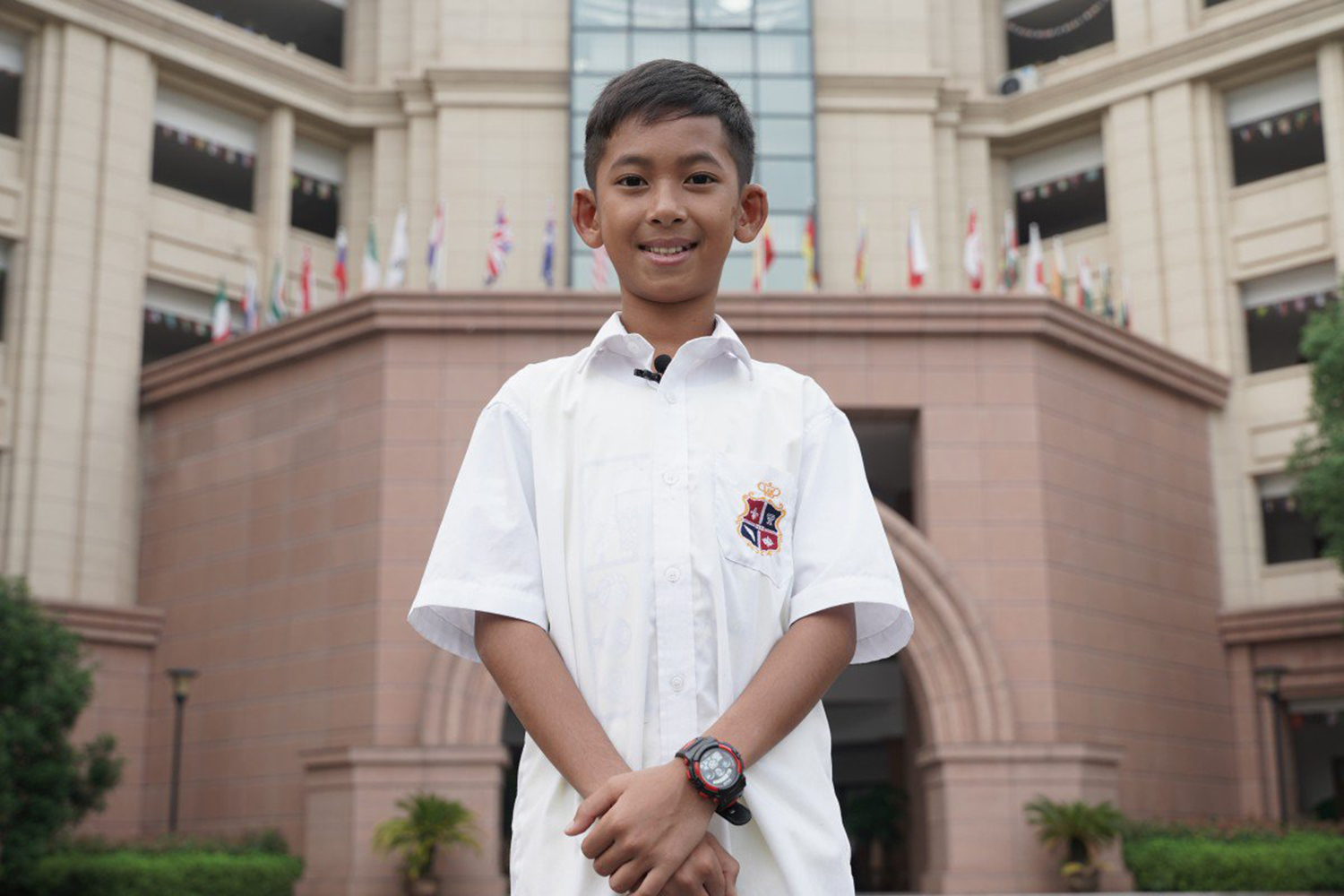
Thuch Salik, the young Cambodian street hawker who became an internet star last year when he was filmed selling souvenirs to tourists at Angkor Wat in more than a dozen languages, has found there is much to like about going to school in eastern China.
Instead of attending classes for half a day then working for his parents for the other half in Siem Reap, the 15-year-old has full-time studies at Hailiang Foreign Language School, a private boarding school in Zhuji, Zhejiang province.
Thuch, who is smaller than classmates his age, is studying and exercising hard in the hope of becoming a strong and educated adult. He had his eye on a place at a university in Beijing, he said.
“I like it here very much, because it is very beautiful,” he said with a grin. “I like studying English and Chinese. I like the classroom, I like to eat rice, and I like my room.”
Thuch, whose story won him admiration and a full-time education, shares a dormitory with three South Korean classmates.
He studies for 10 days in a row then has four days off.
He said he enjoyed school life far from home.
“It’s not tiring. I like it. [In the past], I [had to] sell things when I was not in school. That was very tiring,” he said in rudimentary English sometimes mixed with Chinese.
Thuch shot to fame in November when a Malaysian visitor shared a video of him online as he chatted with tourists in several languages and dialects around the Cambodian temple complex, one of the biggest religious monuments in the world.
Thuch then came to the attention of the Hailiang Education Group, a Nasdaq-listed company which owns the school in Zhuji. Staff liked what they saw – the teenager was an ideal candidate for a project under China’s Belt and Road Initiative aimed at underprivileged children from Southeast Asia.
Thuch was the first student to take part, group public relations director Li Ziqiang said.
“Through this, we hoped to attract more students from Cambodia and its neighbours, like Laos and Vietnam.”
Hailiang spent months persuading Thuch’s parents to let him to go to school in Zhejiang, offering the family a trip to China in January then buying 130 paintings from the boy’s father for US$60,000 (1.8 million baht) to help pay off his debts.
It also promised to sponsor Thuch’s education and cover half of his living expenses until he began his postgraduate studies – if he chose to pursue them, Li said.
“His family hesitated because they would lose an important breadwinner if Thuch left – especially as he had become so famous on social media,” he said.
On the streets around Angkor Wat, Thuch said he earned up to US$15 a day before he became a celebrity. After that, he made much more.
His family had now moved to Phnom Penh, Cambodia’s capital, thanks to help from local businesspeople and charities, Thuch said. There, they continue making a living by selling to tourists.
Thuch’s story is not untypical of a youngster from Siem Reap. He spent seven years working to support his family, while his 12-year-old brother, who is also multilingual, has spent a year in the family business.
Channel News Asia, citing figures from Unicef Cambodia, reported last year that about 80,000 children in the country were not in school when they should be.
As many Cambodian youngsters have done, the brothers picked up languages like Cantonese, Japanese, Korean, Italian and Spanish from tourists in the hope of selling them souvenirs.
“If I stayed in Cambodia, I’d study a little and may not have a good job [in the future]. But when I study here, I study a lot, and maybe I’ll get a good job,” the teenager said.
The family visited the school in January, after which Thuch said he begged his mother every day to let him go to China.
“I want to be a businessman, to make Chinese and Cambodian friends,” he said.
Wang Weihong, Thuch’s art teacher, said his pupil was very interested in Chinese culture, especially calligraphy, painting and sculpture.
“He is diligent and learns fast. He is strict with himself,” the teacher said. “He would be happy to sacrifice his break to finish a task better.”
Chinese teacher Eva Zhu said Thuch was a quick learner but was still trying to fit in with the rest of the class.
“Upon his arrival, we held a welcome ceremony, which made other students wonder why he was so warmly welcomed – why he had different treatment,” Zhu said. “But they quickly understood when we explained that he was from a poor family and he needed help.”
As the sole student from Southeast Asia in his class, Thuch said he often found himself playing alone during breaks.
Frequent visits by the Chinese media had also made his classmates “a little weary”, his teacher said.
For Thuch, the most enjoyable part of his life in China is basketball.
“After school I play basketball,” Thuch said. “I like basketball. It makes me stronger.”